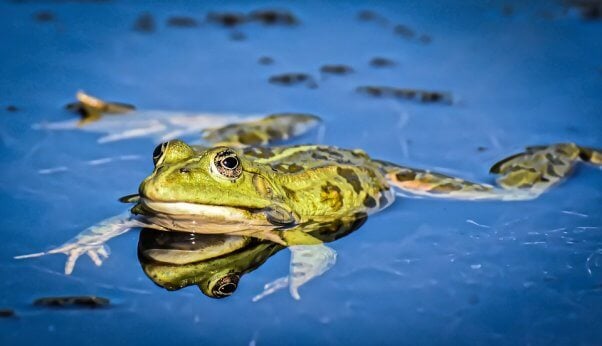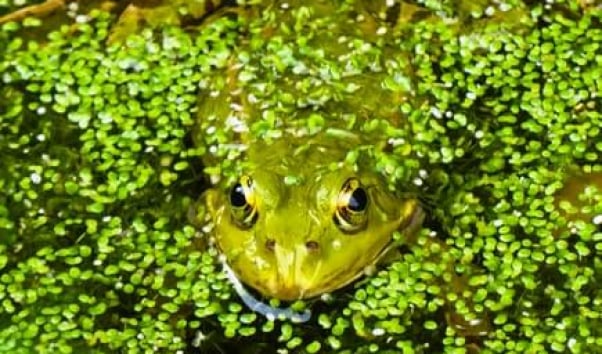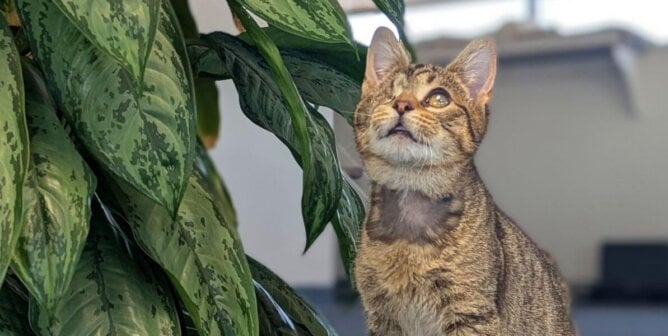The Hidden Lives of Frogs
Frogs are best known for their webbed feet and flying leaps, but these complex, sensitive animals have many other amazing characteristics and capabilities.
Many frog species are devoted—and resourceful—parents. Some species of dart frogs lay eggs on the forest floor, guarding the eggs from predators and keeping them moist by urinating on the eggs if they become too dry. In other species, after hatching, the father or mother will move the tadpoles on his or her back to a water-holding bromeliad (a flowering plant). The parent then feeds the tadpoles by laying unfertilized eggs in the bromeliad until the young have metamorphosed.

Some frogs even protect their offspring inside their own bodies. The male Australian pouched frog has pouches along his side, where the tadpoles live until metamorphosis. Darwin’s frogs from Chile hold tadpoles in their vocal sacs for development.
Male bullfrogs defend their territory by inflating their lungs and floating in open water. If another male approaches closer than about 6 meters, the guarding frog will make a sharp, staccato “hiccup” sound and move toward the intruder. Usually, the intruder will leave, but if he doesn’t, the two frogs will leap at each other until one is forced onto his back.
Most frogs live in moist areas, such as ponds, creeks, and trees. Some species, such as the Catholic frog and the flat-headed frog, can survive in desert environments by using a technique called bloating, in which they burrow during dry seasons and surface during rains to absorb as much water as possible before burrowing again.

Frogs absorb oxygen and moisture through a thin film covering their skin that allows oxygen to be dissolved and passed into their bloodstream. Because of this, frogs are very susceptible to environmental toxins. Pollution, pesticides, and habitat destruction may be some of the reasons contributing to declining frog populations.
Unfroggivable Cruelty
Countless frogs are tortured, killed, and deprived of everything that is natural and important to them. Pins are stuck through their skulls to destroy their brains, and they are dissected in laboratories and classrooms while their hearts are still beating. They are sold as desktop “decorations” by the “pet” industry, doomed to bleak lives in tiny plastic boxes, like Brookstone’s “Frog-O-Spheres,” in which they are slowly poisoned by their own waste.
Frogs struggle to survive as human encroachment shrinks their habitats and people kill them to use their body parts to make drugs. Please, be a frog’s friend: Refuse to dissect and never keep frogs as “pets.”
Fascinating Frog Facts
- Many frogs contain mild toxins that make them undesirable to potential predators. These toxins include irritants, hallucinogens, convulsants, nerve poisons, and vasoconstrictors (which constrict blood flow through veins, arteries, and blood vessels).
- Poisonous frogs are often brightly colored to warn potential predators. At least two nonpoisonous species of frogs in tropical America mimic the coloration of poisonous dart frogs for protection.
- Female gastric-brooding frogs from Australia (who are now probably extinct) swallow their tadpoles, who then develop in her stomach. To do this, she must stop secreting stomach acid and suppress peristalsis (contractions of the stomach).
- Some frog species use a “babysitter” to watch over their eggs until they hatch. In a few species, one of the parents stays behind to watch over the eggs and sometimes stays to care for the tadpoles too.
- In some species, male frogs create choruses during mating season in order to attract more females.




